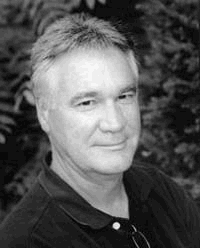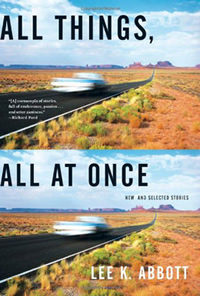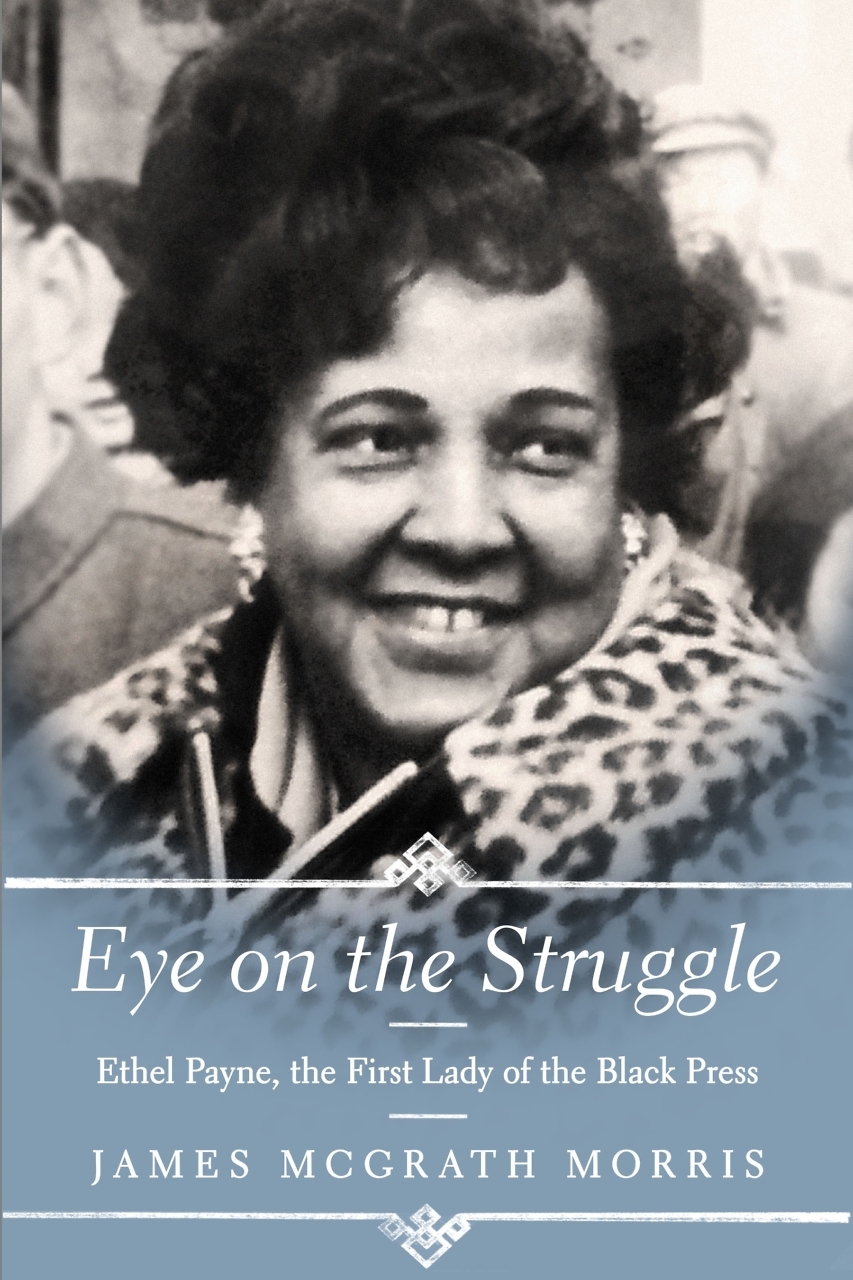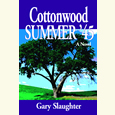In Thrall to What’s Between the Margins
Short-story master Lee K. Abbott talks with Chapter 16 about an entire career spent reading, writing, and teaching
Between the 1980 publication of his first story collection, The Heart Never Fits Its Wanting, and the 2006 publication of his most recent, All Things, All at Once, Lee K. Abbott wrote some of the best short stories of his generation—hell, some of the best short stories of anybody’s generation. Set in the American Southwest and featuring a cast of male narrators who are both loquacious and vital, Abbott’s full-blooded tales earned the highest praise even as their style ran counter to the era’s minimalist chic. By the end of the century, Abbott—who recently retired from the M.F.A. program at Ohio State University, where he was a professor—was widely acknowledged as a master of the short story form.
Prior to his appearance at the University of Memphis October 30-31, Abbott recently answered questions from Chapter 16 via email:
Chapter 16: Reviewing All Things, All at Once for The New York Times, Meg Worlitzer wrote, “Right in the middle of a typically eccentric and loose-limbed story, [Abbott] often grabs us with a moment that becomes sharply moving—and then almost unbearably so.” After “sharply moving,” why even add “almost unbearably so”?
Lee K. Abbott: First, a story. In 1986, I happened to be giving a reading at my M.F.A. alma mater, the University of Arkansas in Fayetteville. It was a Thursday, and, lo and verily, the review (by Amy Hempel, it turned out) of my second collection of stories, Love is the Crooked Thing, was to appear the following Sunday in The New York Times Book Review. Hence, gathered around a table in the dining hall of the student union to read the review were my mentor, Bill Harrison, James Whitehead (poet/novelist/teacher extraordinaire), and yours truly. It was, as everyone was at pains to note for me, a terrifically positive notice. Still, I was semi-depressed. There was a “but” in it. And subordination that did not hearten. And none of the over-the-top praise I was rooting for. At which point, Bill reminded me that no writer gets the review he/she wants. There’s always a “but.” Always a dependent clause that semi-retracts what the independent gave away.
 That said, there’s nothing wrong, to answer your question more directly, with a “sharply moving” even if it’s tempered by an “almost unbearably so.” In other words, I am grateful for the space and thankful that Ms. Wolitzer didn’t say, in the venue most of us scribblers think the finest for such, that I was a hack, a fraud, and probably a pornographer to boot. I did (and do) like “eccentric” and “loose-limbed.” That’s me, on and off the page.
That said, there’s nothing wrong, to answer your question more directly, with a “sharply moving” even if it’s tempered by an “almost unbearably so.” In other words, I am grateful for the space and thankful that Ms. Wolitzer didn’t say, in the venue most of us scribblers think the finest for such, that I was a hack, a fraud, and probably a pornographer to boot. I did (and do) like “eccentric” and “loose-limbed.” That’s me, on and off the page.
Chapter 16: You came to prominence in the 1980s during the rise of what is commonly called minimalist fiction, popularized especially by Raymond Carver. And yet your own writing might be called maximalist. How did such divergent prose styles not only coexist but simultaneously flourish? And do you have anything to say about minimalism and/or its aftereffects?
Abbott: I always felt, with respect to the mini vs. maxi matter, that I was swimming against the current. The writers I liked—old school masters, like Updike and Cheever and Peter Taylor and Faulkner—preferred more and more again. Hence, I understood very little about the impulse to shrink the yarn. Ray Carver and his kind had enormous influence; indeed, many are still moved to tell the story small. Here’s what I’ve concluded: the tent is big enough for us all, and to fret about what’s chic is a colossal waste of time. That we’re so diverse a crowd is a delight to me. A good story is a good story.
Chapter 16: The literary success of your novella Living after Midnight would seem to indicate that you could have, had you chosen to, gone on to a successful career as a novelist. Many short-story writers, in fact, do go on to write novels. You never did. Why?
Abbott: About Living After Midnight, this embarrassing confession: a character’s name changed on page nine, and I knew enough to know that there was still more to know. When Hoffman became H-man, I knew I couldn’t quit after my usual twenty to thirty pages. To do justice to those people who had galvanized my imagination, I ended up going 180 pages or so. Really, to paraphrase Lenny Bruce, it was one of those parties that got out of hand.
 More seriously, I don’t go “long” because of a number of things peculiar to me. For example, I don’t know enough to write a novel. Whenever one of my students tells me she wants to write a novel, I ask one question: What’s your favorite book? Then I ask a second question: How much did X have to know to write that book? Think, for instance, about all Melville had to know to write Moby Dick. Here’s something else, by way of explanation: I fear spending two, three, or four years on a something that turns to dust in my hands. Yes, old-fashioned failure haunts me. A story I don’t mind investing a month or two or three on only to have it explode. And, yes, there’s the matter of style: my voice on the page exhausts me to write. And, yes, I use up a lot of material for a story. Finally, whenever I’ve gone longer than is my custom, I feel that I’m lying. I know only two things: the genius of story is its brevity; and, story succeeds by what it leaves out. (Okay, you got me: this, too—I both dread and welcome the unexpected corner every story must turn, the monster or angel who awaits before we can type The End.)
More seriously, I don’t go “long” because of a number of things peculiar to me. For example, I don’t know enough to write a novel. Whenever one of my students tells me she wants to write a novel, I ask one question: What’s your favorite book? Then I ask a second question: How much did X have to know to write that book? Think, for instance, about all Melville had to know to write Moby Dick. Here’s something else, by way of explanation: I fear spending two, three, or four years on a something that turns to dust in my hands. Yes, old-fashioned failure haunts me. A story I don’t mind investing a month or two or three on only to have it explode. And, yes, there’s the matter of style: my voice on the page exhausts me to write. And, yes, I use up a lot of material for a story. Finally, whenever I’ve gone longer than is my custom, I feel that I’m lying. I know only two things: the genius of story is its brevity; and, story succeeds by what it leaves out. (Okay, you got me: this, too—I both dread and welcome the unexpected corner every story must turn, the monster or angel who awaits before we can type The End.)
Chapter 16: The great short story writer Frederick Busch maintained that we go to the short story for news of “the unannounced life.” He said that your work “celebrates the immensity in each character’s moment.” What is Busch talking about?
Abbott: You know I’m not sure what Fred is talking about. Honest. But I’m damned glad (and humbled) that he was talking about it in regards to me. (You know, of course, that he coined the phrase “the willed word” to describe all writing, right?) I do think I understand the “unannounced life.” It’s the one you and I have, a life lived off-stage, in the shadows, in the hinterlands, behind the curtain—the one made loopy and dangerous by our dreams and our disappointments. It’s the life of little interest to those who write the headlines.
Chapter 16: At the beginning of your career, you supported your art, as many young writers do, by teaching. Over time, though, I wonder if the teaching didn’t become as important as the writing. At Ohio State, where you taught for the last couple of decades, your students revered you. Would you comment on the relationship between your writing and your teaching?
Abbott: I love teaching. Period. It was and remains an essential complement to what I do on the page. Rare has it been in my career that I’ve left the classroom without having had to re-examine an issue of craft or design that I believed in. I love the to and fro, the debate, the passion, and the risk. Somewhere, the novelist William Gass says that finding out that stories are made out of words is like finding out that your wife is made of rubber. Yet, there we are, at the seminar table, trying to breathe life into rubber. Amazing, isn’t it?
Somewhere, I heard that if you wanted to be a writer, don’t be a teacher; still, if you must teach, teach French. The theory was that you wouldn’t want to use the resources and talents and desires necessary to the “liar’s art” on your job. I disagree. Teaching has made me wiser. Teaching has kept me modest. Teaching has taught me to listen. Teaching gave me patience and good humor and big ambition and self-discipline. I’m tickled all sorts of silly and pink to have spent thirty-five years yapping at folks in thrall to what’s happening between margins.
Chapter 16: You argue that writers are allowed only two exclamation points in their lifetimes. Where did you use yours?
Abbott: Exclamation points. Hmmmmm. I think I used my two on Facebook. Or maybe it was the time I won sixty-nine bucks from the Ohio lottery. Or maybe it was the time, only a few years ago, when I made a double eagle on a par five. On the page, however, I don’t think I’ve ever used one. I like having them in reserve.
Lee K. Abbot will appear at two events this week at the University of Memphis. As part of the River City Writers’ Series, Abbott will read from his work October 30 at 8 p.m. in the University Center, Room 300 (River Room). A book signing will follow. He will hold an interview with students October 31 at 10:30 a.m. in Patterson Hall, Room 456. Both events are free and open to the public. Click here for details.





